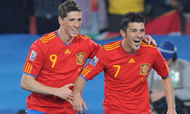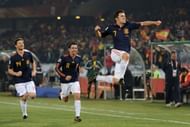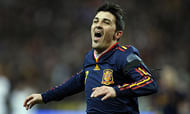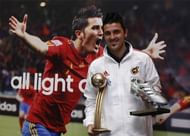Iniesta plays a through pass to JuanFran on the right! JuanFran pulls the ball back for David Villa, who back heels the ball into the net! A wonderful goal by the The Kid in Asturias, El Guaje, who would subsequently be substituted in his last game as a Spanish player. There were tears on the bench and in the crowd. And why won’t there be? It was the end of an era.
It was hard on the Spaniard to exit the World Cup in such an unceremonious fashion as former World Cup champions were humiliated in the competition and just managed to save their face against a gritty Australian team, winning 3-0 on the night. On another day, it would have been Spain’s day, with the lethal attacking force that they possessed in the past. And a pivotal part in the setup was played by David Villa, who made his debut in Spanish colours in 2005 and has never looked back since. Earning the Silver Boot at the 2010 World Cup due to his amazing technique, finishing and unpredictable pace, he played a key role in lifting Spain to glory in Euro 2008 and the 2010 World Cup.
His prolific goals-scoring capability came to fore in the 2006 World Cup where his World Cup debut, after replacing another prolific striker Raul, was marked by a brace from El Guaje and the opening goal against tournament favourites, France. Ultimately, Spain lost against the French but this didn’t deter Villa from being Spain’s top scorer in the World Cup, a feat that he shared with his fellow Spaniard, Fernando Torres.
The two then combined brilliantly to set goals for each other as Villa became the first man, after the Dutch legend Patrick Kluivert, to score a hattrick in a UEFA European Competition since 2000. Such was the camaraderie shared between the two Spaniards that he straight away rushed to Torres, who was on the bench, to celebrate this stupendous feat. He continues his goal-scoring prowess as his 92nd goal against an unpredictable Sweden side, making La Rojas advance to the next round. Subsequently, Spain went on to win their first European tournament in 24 years, thanks to some amazing performances from Villa. Though he didn’t play the last two matches of the competition due to injury, he amassed 4 goals in the competition, making him the highest goal-scorer in the competition and awarding him with the Golden Boot.
Villa was not done yet. In the 2010 World Cup Qualifying Round, Villa scored four goals in three games for Spain, taking his international goal tally for a single calendar year to 12 goals. A record that was held by Raul for 10 years had been broken. The diminutive Spanish striker went on to be the first Spanish player to score in six consecutive games, scoring a goal in a 2-0 win against England in a friendly. He equalled his own goal-scoring record for a calendar year in Austria by scoring his sixth international brace against Australia. A befitting venue for the achievement as this was the place where Spain had won the European Championship the previous year.
Such was the charisma of the Spanish striker that his manager, Vicente Del Bosque, went on record to say that he would have David Villa over Kaka, a man at the peak of his form in those days, and Cristiano Ronaldo. His prolificacy in front of goal was rewarded with the numero uno position in IFFHS “2010 World Top Goal Scorer at International Level” rankings. Villa’s threat in front of goal was not hindered as he scored the decisive goal against Chile in a 2-0 win for Spain in the 2010 World Cup, becoming Spain’s all-time top goal scorer in World Cup Finals with 6 goals. Spain progressed to the round of 16 where Villa was on target yet again as his lone goal against Paraguay proved decisive to push Spain into the quarterfinals, where he again scored the only goal for Spain to rake them through to the semis. Spain went on to win the World Cup with Villa getting the Silver Boot, although he had the same goals as German international, Thomas Muller, who got the Golden Boot since he had more assists than the rest.
In the subsequent year, Villa carved a definite niche for himself as he netted a brace against the Czechs in a Euro 2012 qualifier, concealing Raul in the goal-scoring record books. He was pivotal in Spain’s qualification for the competition and scored his 50th international goal against Scotland in a 3-1 victory for Spain. It was in this match that Vicente Del Bosque had realized the influential figure that he is and had given him the captain’s armband, Villa’s first of his career.
But age was starting to take a toll on him as his injury list lengthened. He made one last landmark achievement in the 2013 Confederations Cup as he scored a hattrick in a 10-0 demolition of Taihiti before revealing to the world that he would retire at the end of the 2014 World Cup. And he retired in style by scoring a quality goal in his penultimate match.
As the Spanish nation is full of some young and prospective talents who, ultimately, have made it big on the big stage, there is little doubt that he may be replaced on the international stage. But the sheer influence and aura that he brought into the national team can never be forgotten or be substituted. Along with his fellow striking partner, he transformed the Spanish fortunes from being title chokers to title contenders. And, if one goes with his records, scouting a talent of Villa’s stature may just prove to be too much for man to handle. The Bible says that David was a simplistic teenager who fought the mighty Goliath on his own, defeating him with his valour and wrote his name in the history books. His namesake started off his international career as a young player, took over the mantle from one of the greatest Spanish players ever, Raul, and continued to give stellar performances, making him one of the most prolific Spanish football strikers in World Cup history. A stark resemblance. But a truth, not an exaggeration.






